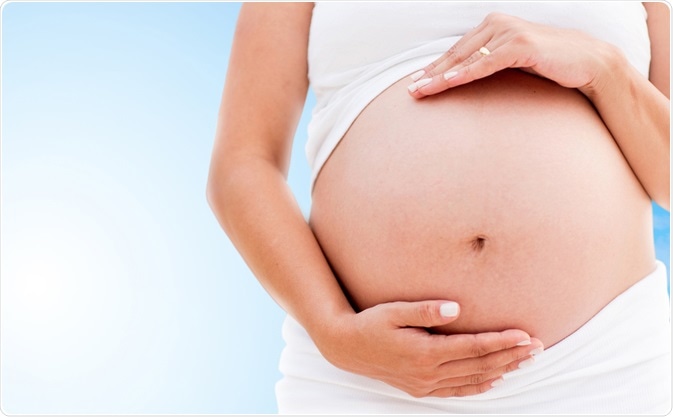Cancer of the breast is the most common cancer in women. In 2020, 2.3 million women were diagnosed worldwide (WHO, 2021). Being female is a strong risk factor for breast cancer. Pertinent to a female prevalence, pregnancy has been found to have a profound impact on the risks associated with developing breast cancer. This article considers the dual nature of this risk which may either be increased or decreased according to parity. Here we’ll also look at a rare but potent form of cancer that sometimes occurs during pregnancy.

Image Credit: ESB Professional/Shutterstock.com
Focus on breast cancer
Breast cancer is a malignancy that afflicts women. Approximately 0.5 – 1% cases occur in men. The breast is an extremely plastic organ and one that undergoes many developmental changes throughout life. Such changes may permanently alter the mammary gland and can either promote or prevent the development of cancer.
Breast cancer occurs more commonly in the epithelium of the ducts or sometimes in the glandular tissue. These tumors are termed carcinomas, or more specifically adenocarcinomas due to their propensity for cellular dysfunction. Sometimes sarcomas arise in the muscle tissue and more rarely other types and subtypes of cancer are found.
Initially, the cancer remains in situ, but there is a potential for metastatic spread to the surrounding tissues and other places in the body which can prove lethal.
Breast cancer and pregnancy: Reduced risk
Pregnancy has been found to have a profound impact on the risks associated with developing breast cancer. The age of parity is especially significant. It is known that women who choose to have children in their 20s, and particularly those under 25, are at a much-reduced risk of developing breast cancer.
On the other hand, women who become pregnant for the first time after the age of 30 or who have not had a full-term pregnancy stand a greater chance of developing breast cancer. Research identified an increased short-term risk around 2 to 15 years after pregnancy (DePolo, 2019). But why this should be the case is a mystery.
It is known that a woman’s risk of breast cancer is reduced when she has children in accordance with the following factors:
- age of birth
- the number of children
- breastfeeding
Breast cells develop during adolescence and remain immature until gestation occurs. The cells mature and assume regularity in terms of growth. In addition to this, the number of menstrual cycles is reduced ––an associative factor of pregnancy that is also thought to have a protective effect.
Studies have revealed that the reduction in risk to women who give birth before age thirty does not kick into effect until around two decades later. Women who give birth below the age of 30, therefore, have a reduced risk of developing cancer after menopause.
Breast cancer and pregnancy: increased risk
Breast cancer risk in older women who have not experienced a full-term pregnancy is heightened because they are exposed to increased levels of estrogen and because the breast cells take longer to fully mature.
Doctors have harbored concerns that fertility treatments might increase the risk of developing breast cancer because the medicines that stimulate the ovaries are like estrogen. Recent studies have gone some way toward allaying these concerns, but further research is needed to better assess the situation.
Pregnancy-associated breast cancer (PABC)
Pregnancy-associated breast cancer or PABC is found in around 7% of breast cancer cases (Genin, 2016). It constitutes a particularly aggressive form. PABC is diagnosed during pregnancy or shortly afterward in the postpartum period ––the parameters of this period are ill-defined necessitating care when interpreting the results of research findings. The typical postpartum term is around 1 year in the literature.
The prognosis of PABC remains controversial. This aggressive form of cancer is usually diagnosed at an advanced stage. PABC patients have an increased risk of localized relapse. There have been calls to extend the postpartum window to 6 years to account for the increased risks detected during this time.
The number of women diagnosed with PABC has increased in recent years in the western world. This trend looks set to continue as women delay childbearing age for various personal and socio-economic reasons. It serves us to bear in mind the relative risks remain low for what remains an otherwise highly personal and complex decision to have a child.
In summary
Breast cancer is the most common form and affects predominantly women. Both pregnancy and parity have been implicated in the risks associated with developing this form of cancer. These effects may be beneficial or may be adverse.
We are currently in the earliest stages of understanding the molecular mechanisms involved in the development of breast cancer, but continued research offers the potential to find better-targeted treatments in the future.
References:
- DePolo, J. (2019) Breast Cancer Protection from Childbirth Starts Later Than Thought. Breastcancer.org. Online: https://www.breastcancer.org/research-news/bc-protection-from-childbirth-starts-later.
- DePolo, J. (2021) Study Finds No Link Between Fertility Treatments and Breast Cancer Risk Breastcancer.org. Online: https://www.breastcancer.org/research-news/no-link-between-fertility-treatments-and-breast-cancer-risk.
- Genin, A. S. (2015) Association with Pregnancy Increases the Risk of Local Recurrence but Does Not Impact Overall Survival in Breast Cancer: A Case Control Study of 87 Cases. The Breast. Doi: http://dx.doi.org/10.1016/j.breast.2015.09.006.
- Slepicka, P. (2019) Pregnancy and Breast Cancer: Pathways to Understand Risk and Prevention. Trends in Molecular Medicine Doi: https://doi.org/10.1016/j.molmed.2019.06.003.
- Wang, B. (2019) Clinicopathological characteristics, diagnosis, and prognosis of pregnancy-associated breast cancer. Thoracic Cancer. Doi: 10.1111/1759-7714.13045.
- Whyte, C. (2018) New Clues to Unravelling Link Between Pregnancy and Breast Cancer Risk. New Scientist. Online: https://www.newscientist.com/article/2183249-new-clues-to-unravelling-link-between-pregnancy-and-breast-cancer-risk/#ixzz78KwTxc3Q.
- World Health Organisation (WHO) (2021) Breast Cancer, 26 March 2021. Online: https://www.who.int/news-room/fact-sheets/detail/breast-cancer.
- Shao, C. (2020) Prognosis of Pregnancy-Associated Breast Cancer: A Meta-Analysis. BMC Cancer. Doi: https://doi.org/10.1186/s12885-020-07248-8.
Further Reading
Last Updated: Dec 7, 2021